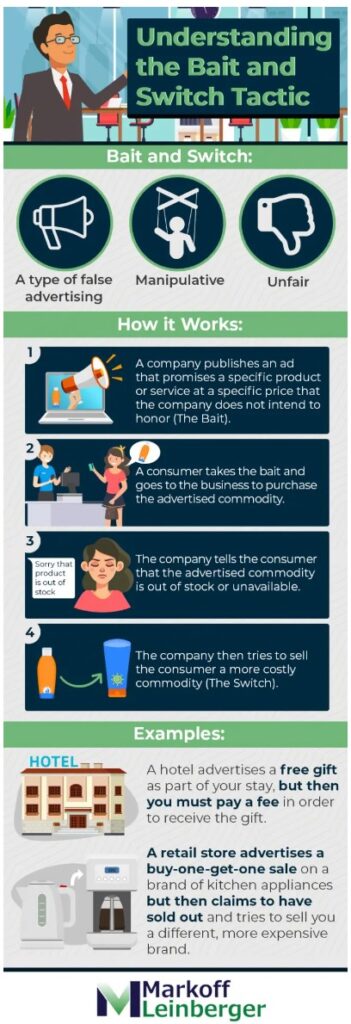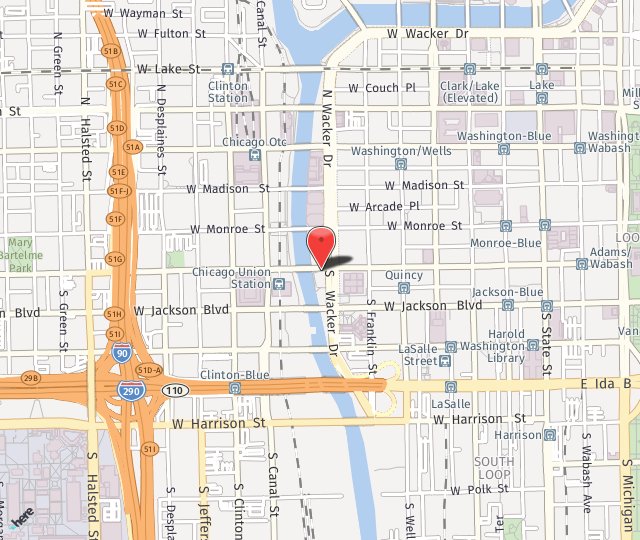The bait-and-switch tactic is a type of false advertising that involves luring a consumer in with a great promotion that the seller does not intend to offer. Federal and Illinois laws prohibit false advertising, and perpetrators of such schemes can be held accountable through legal action.
If you think you’ve been a victim of illegal bait-and-switch advertising, one of the false advertising lawyers at Markoff Leinberger can help you stand up for your rights. We will review your case at no cost.
Bait-and-Switch Basics

The strategy behind a bait-and-switch scheme is to capture your interest by advertising a great offer like a free gift or a low price on a particular product or service. When you attempt to redeem the offer, the seller denies the promotional offer in a ploy to achieve the company’s underlying goal of selling you a more expensive product or service than was advertised.
Bait-and-switch tactics are used in a range of retail settings, despite being prohibited per the Federal Trade Commission (FTC) and Illinois laws in place to protect consumers from unfair tactics. Unfortunately, companies continue to employ this strategy, and consumers find themselves wasting money and time.
Bait-and-Switch, or Not?
There is nothing wrong with advertising products and services at a great price, unless there is no intention to honor the promotion. This is what separates effective marketing from the false advertising tactic known as the bait-and-switch.
A legitimate promotion captures the consumer’s attention, draws them to the business, and allows the consumer to obtain the advertised product or service at the advertised price. It is a win for both the consumer, who gets a great deal, and for the seller, who makes a sale and introduces a consumer to the business.
In contrast, consumers defrauded by a bait-and-switch are denied the advertised product or service. The company may claim to have run out of stock or that an unadvertised fee applies. The consumer always loses in a bait-and-switch, which is why the law allows for legal action against companies employing this tactic.
When to Sue over Bait-and-Switch Advertising
It can be confusing to know when a company is using deceptive advertising, but one of our experienced consumer rights lawyers will be able to get to the bottom of the situation and determine if you have a case. As mentioned, the biggest distinguishing feature of bait-and-switch lies in the intent.
Bait-and-Switch Techniques
- Seller purposefully does not have the promoted item in stock.
- Seller does not disclose that only a limited number of promotional items are available.
- Salesperson denigrates the advertised product in an attempt to get you to buy another product instead.
- Seller provides incentive for salespeople not to sell the advertised product.
- Seller will not process orders for the promoted item.
- Seller will not fulfill orders for the promotional item in a reasonable time frame.
- Seller charges a fee for you to redeem a “free gift” offer.
Acceptable Sales Techniques
- Seller pitches you on a different item, but when you request the promotional item, he or she sells it to you at the advertised price.
- A store is overwhelmed by the response to the promotion and runs out of the advertised item. When you ask for the promoted item, the salesperson offers to show you similar products or to take your order for the promotional item at the promotional price.
- The advertisement states that limited quantities of the promotional item are available.
Contact Us for a Complimentary Consultation
The consumer rights attorneys at Markoff Leinberger can assess whether you have a bait-and-switch case. Call 312-726-4162 to schedule your free consultation. We serve clients in Chicago and throughout the U.S.

